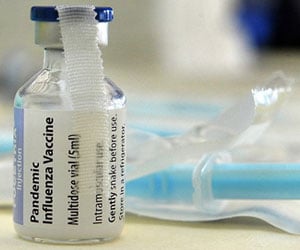In less than 3 months, life-saving albuterol inhalers used by nearly 40 million patients with respiratory disorders will no longer be sold. After December 31, 2008, it will no longer be permissible to manufacture or sell albuterol inhalers in the U.S. that contain chlorofluorocarbon (CFC) propellants, because they destroy the Earth’s ozone layer. These inhalers have been replaced with four distinct non-CFC propelled alternatives, which contain hydrofluoroalkane (HFA) propellant.
At a national press briefing held during the Annual Scientific Meeting of the American College of Allergy, Asthma and Immunology (ACAAI), representatives from the organization and Allergy and Asthma Network Mothers of Asthmatics (AANMA) urged the medical community to educate their patients with respiratory disorders about the upcoming CFC-to-HFA transition.“This is the first time that an effective medication has been removed from the market in the USA for an environmental issue,” said Ira Finegold, M.D., chief of the Division of Allergy and Clinical Immunology in the Department of Medicine at St. Luke’s -Roosevelt Hospital in New York, and past president of the ACAAI. “However, the newer products available are not identical and each has specific differences. Physicians should monitor patients making the transition to HFA albuterol to be sure they understand the differences in the use and care of the newer products.”
While the transition has been forthcoming for some time, data from IMS Health show that 14 million patients are still utilizing the older inhalers. A medically responsible transition protocol assures patients are not unknowingly exposed to health risks beyond their control.
“A significant number of patients are still not aware of the federal mandate, or how to safely go about making this change,” said Nancy Sander, president and founder of AANMA. “Patients and physicians need to know that inhalers are changing, these changes are mandatory, and there are important decisions to make about treatment options that require thoughtful consideration of the patient’s medical history and current respiratory health status.”
Both ACAAI and AANMA urge patients and physicians to be aware that the new HFA propelled inhalers are different than what most patients may be used to, and, as such, education is required. Some differences include:
• Since there are only branded products available, prescriptions and patient instructions should be appropriate to each product.
Advertisement
• HFA MDIs have different cleaning requirements. HFA MDIs need to be cleaned more frequently than CFC MDIs. The HFA medication tends to clog the exit port of the plastic actuator more quickly than CFCs. This prevents medication from reaching patient's airways, which may explain why patients sometimes report HFA inhalers aren't working.
Advertisement
• There may be price differences among the branded HFA products and they will cost more than the soon to be discontinued CFC products, which included some generic choices.
“As CFC inhalers are phased out, patients must be prepared for changes to their usual medications,” said Dennis Spangler, M.D., Atlanta Allergy and Asthma Clinic. “In addition to changes in spray, new cleaning and priming requirements, there are cost considerations that patients will need to recognize. It’s important that physicians urge their patients to remain on the medication prescribed to them, rather than turn to less expensive alternatives. Coupon and patient assistance programs are readily available to help ease the transition.”
Patients with asthma, COPD and other respiratory conditions use albuterol at the first sign of symptoms, before exercise and when experiencing breathing exacerbations. Because there are significant differences between CFC and HFA inhalers, patients and medical professionals need to have the opportunity to make the switch in a medically responsible way.
Source-Newswise
LIN









